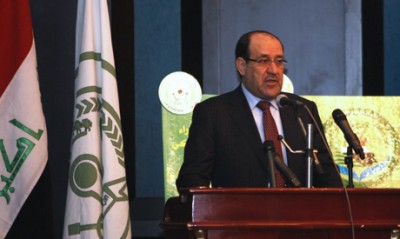Another ‘Bogus’ Contract in Iraq Revealed

Photo: Iraqi Prime Minister Nuri al-Maliki speaks to supporters in Baghdad, December 14 2013 (Photo: Reuters)
A Swiss-based Iraqi engineer exposes what appears to be another multi-billion dollar scam in which the Iraqi government of Nouri Al-Maliki is implicated.
Iraqi engineer Muthna Kubba, who works in Switzerland, however, said Satarem appears to be fake.
In a letter sent to Maliki, a copy of which was obtained by Ahram Online, Kubba said he carried out a thorough investigation in Switzerland into the company and concluded it only exists on paper.
As a resident of Canton Zug, Switzerland, Kubba decided to follow up on all available information on Satarem. His enquiries led him only to a small law firm in Canton Zug in Switzerland that could be an agent to Satarem’s anonymous owners.
According to Kubba, the company was registered in the office of the Zug Trade Registrar with an authorised share capital of 100,000 Swiss francs in 2008, which was raised to 400,000 Swiss francs this year.
The stock holders remain unnamed, he wrote.
Kubba, who is running his own engineering business in Switzerland, said neither the company’s status nor its capital qualifies it to build and operate such a huge project.
A website shows a company with the name of Satarem Europe as having the same address given by Kubba. The website also shows several other addresses for Satarem in different countries, including India, Colombia and South Africa.
Efforts to reach the company were unsuccessful.
In his letter, Kubba said when he went to the company’s address posted on its website he found only a sign on the building’s entrance but no details about floor or office numbers.
“When I dialed the company’s telephone number, which is posted on their website, the answer I received was that it is a law company at the same address,” he wrote.
“Obviously, this indicates without any reasonable doubt, that this company is fake, with no entity, and no record of business in the oil or refinery sectors, and it is unqualified to implement a $6.5 billion contract,” Kubba wrote.
Kubba asked Maliki for a full investigation.
Iraq said the refinery is one of four new projects designed to increase refining capacity by around 740,000 bpd, to revamp Iraq’s oil sector left dilapidated by decades of war and sanctions.
“Today, we sign a contract for an important investment project with the participation of the private sector, which will contribute towards fulfilling the need of the country for oil products,” Reuters quoted Maliki as saying at the signing ceremony.
In 2011, the Iraqi government cancelled a $1.2 billion power generation contract with CAPGENT, a Vancouver-based company, after it was disclosed that it was a fake company.
Questions about CAPGENT were first raised by Jawad Hashim, an Iraqi national who lives in West Vancouver. He also conveyed his concerns to Maliki.
Corruption in Iraq has become endemic, with Transparency International ranking Iraq as among the world’s most corrupt countries.
Many Iraqis believe that the government is so full of compromised officials that they can do little to stop it, even if they wanted to.
Several reports recently have revealed that bribes form the backbone of conducting business and getting things done in the country, while bureaucrats responsible for dealing with companies could be corrupt or incompetent, or both, sometimes awarding contracts to their own companies.

